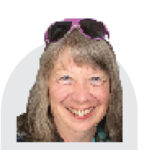Building a Killington Dream Lodge, part 21
Important steps were being taken in building our Killington dream lodge. Dad bought an oil tank and furnace. A septic field was laid out. They were all costly and progress was dictated by a limited budget and work just on weekends.
When I completed my Kleiningersheim internship, Dr. Leibrecht sent me to Heidelberg to study German at the Schiller campus. Afterwards, I returned to Austria, skied at Dachstein (without incident!) and spent time with Christine and Herbert in Graz. Their chalet outside of town was surrounded by forest like ours in Vermont. I felt at home and helped care for their son. Christine taught me Austrian recipes like a jelly-roll cake and her mother made me a “dirndl,” a blue flowered jumper, white blouse under, worn with a pretty pink apron.
I took the train to Le Havre and sailed home on the new Queen Elizabeth II’s maiden voyage. I conducted a survey of passengers on world issues for my statistics course. Back in Vermont, I completed my studies and worked at Save the Children in Westport, Connecticut, engaging schools in adopting villages and connecting their students with Third World children.
In Killington, electrical outlets and plumbing connections were being installed. It seemed our Dream lodge was coming together. We celebrated and friends named it “the Party House.”
“What next?” I thought. I hadn’t a clue. The Peace Corps perhaps? Then I attended church. Several parishioners were leaders in the United Methodist Church’s Board of Global Ministries. One suggested, “Why not apply to the Mission Intern Program and work abroad on human rights issues? Then you can share what you learned when you return.”
I inquired, applied, and signed up right away and was assigned to work in Argentina with a social service group, the Evangelical Center of Social Action. My companion, Vicky, wanted to teach poor young mothers nutritious meals using complementary proteins (like beans combined with corn or rice, and potatoes with milk) which supply all amino acids without costly meat.
We arrived months after the military junta’s coup d’état when General Videla overthrew Isabel Peron. Vermont’s peace and solace were the antithesis of the fear we felt living under Argentina’s military dictatorship. Armed soldiers with machine guns stood on roofs and street corners. Our phone was tapped. We could hear the clicks. We lived above a Methodist church. I worked with abandoned women and their children in “villas miserias,” shanty towns, slums.
Citizens disappeared every day. My friend Carmen was one of the Mothers of the Plaza de Mayo whose children and grandchildren were among more than 30,000 people who disappeared, were kidnapped, tortured and killed in Videla’s “Dirty War.” Everyone was suspect. We felt the terror. But what broke my heart most was when I learned General Videla and his henchmen were trained in the School of the Americas, located in the Panama Canal Zone, funded and run by the U.S. Department of Defense.
The final assault on the Argentine people was on the economic front. Inflation was a staggering 800%. A middle class family moved into the church when their rent increased to an impossible amount.
I helped an ecumenical team create a home for children and their mothers to become self-sufficient. Women were trained to use sewing machines for more secure work than as private maids. I wrote an article about the model family home for Response magazine.
Before Christmas, Vicky and I crossed the Pampas by train and stayed with a Mapuche Indian family. Emilio Epullan was the chief, “cacique,” of his tribe. His beautiful wife Louisa and their son lived in the Province of Neuquen where the grasslands met the Andes foothills. Louisa’s wish was for a decorated Christmas tree but trees were scarce on the pampas. Vicky and I made pretty ornaments with colorful candy wrappers Louisa had saved. We attached them to a branch and sang Christmas carols for the unveiling of her first “Christmas tree.” Louisa was elated and we were thrilled.
Vicky and I rode Mauricio’s horses and attended gatherings of the tribe. We learned the chief is the poorest tribe member and gives away whatever one needs. We also met Pilaga, Mattaco and Toba tribe members in El Chaco bordering Paraguay. They were originally hunter gatherers but over-grazing of cattle caused widespread deforestation — 80% of the Toba population suffered from tuberculosis due to severe malnutrition. Churches built a T.B. clinic and met other needs the government didn’t. A missionary couple we met were putting the tribes’ spoken languages into writing. Language is a powerful thing.
Argentina changed me.
I returned home underweight and clinically depressed. I wanted to help but I felt powerless that our government was funding the people’s oppression.
Then I learned that while I was away, Dad was diagnosed with colon cancer. The surgery was successful but left him with a permanent colostomy. After several months, he returned to Vermont to rebuild his strength and regain his passion. Not even life-threatening cancer could deter Dad from continuing to build his Killington legacy.
I returned for phase two of the Mission Intern Program and worked in the homeless meal and outreach program at Pace Memorial United Methodist Church in Richmond, Virginia. I also spoke throughout the state about Argentina’s human rights situation in schools, universities, conferences, and churches.
I drove to Vermont as often as possible where a major development was taking place. My parents were moving up in the world, to our dream lodge’s second floor! Dad’s successful surgery, his healing, and the upstairs were the best homecoming gifts I could have. It gave us all a feeling of completion, but our Killington dream lodge was still far from done….
Marguerite Jill Dye is an artist and writer who divides her time between Killington and Bradenton, Florida. She loves to hear from her readers at [email protected].




